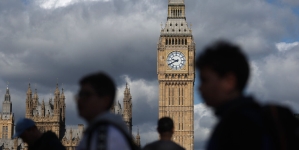-
Powerful unions allege schools are misusing money for arts education - April 1, 2024
-
A portion of Mulholland Drive, damaged by mudslides in winter storms, reopens - May 26, 2024
-
‘Maybe You Don’t Want to Win’ - May 26, 2024
-
Donald Trump Putting Law Enforcement in Danger: Attorney - May 25, 2024
-
Avoid the waters of these 5 L.A. County beaches this holiday weekend, public health officials say - May 25, 2024
-
Bawdy Comedy ‘Anora’ Wins Palme d’Or at Cannes Film Festival - May 25, 2024
-
Map Shows Heat Wave Zone Spread Into Five New States - May 25, 2024
-
Azusa police arrest suspected slingshot-wielding vandal - May 25, 2024
-
Donald Trump Hammers Judge Ahead of Jury Instructions - May 25, 2024
-
Sometimes U.S. and U.K. Politics Seem in Lock Step. Not This Year. - May 25, 2024
Powerful unions allege schools are misusing money for arts education

Powerful unions have joined forces with former Los Angeles schools Supt. Austin Beutner to call for state intervention to stop what they allege is the misuse of voter-approved funding to expand arts education in California.
In a letter to Gov. Gavin Newsom and other state officials, Beutner and the unions claim that some school districts are taking funding, approved by voters in November 2022, to expand arts education and are using it for other purposes. This year that funding totals $938 million.
The unions that signed the letter are California Teachers Assn., the largest state teachers union, and CFT, the other major statewide teachers union. Also signing the letter are the largest unions in the L.A. Unified School District: Local 99 of Service Employees International Union, which represents the greatest number of non-teaching school employees, and United Teachers Los Angeles, the second-largest teachers union local in the nation. Other unions include Teamsters Local 572, which also represents L.A. school district workers, and the teachers union for Oakland Unified.
“Some school districts in California are willfully violating the law by using the new funds provided by Prop. 28 to replace existing spending for arts education at schools,” the letter states.
Under the new law, the money must be used by schools to increase arts programs and each school can decide how best to add on to their programs. The arts windfall is drawn from the state’s general fund — at an amount equal to 1% of all money spent on schools serving students in transitional kindergarten through 12th grade. Thus the money is ongoing and will generally increase each year.
The letter lists no specific examples and does not name districts that are suspected by unions of being in violation of the law. Beutner said there is concern that whistleblowers could become targets for retaliation.
The unions and Beutner are calling on the state to require that districts certify within 30 days “that Prop. 28 funds have not been used to supplant any existing spending for arts education at any school.” In addition, the signatories want the state to require school districts to list “additional arts and music teachers” employed by each school district in the current school year and “how that compares” to the prior year.
“We say more means more,” said UTLA President Cecily Myart-Cruz. “That means every student at every school in the entire state, and that also has to translate to more educators and classified workers in every school.”
Beutner authored Proposition 28 after he left L.A. Unified in June 2021 and voters subsequently approved the ballot measure by a nearly two-thirds margin. Students were to benefit starting in the current school year.
The text of Prop. 28, points to research that the overwhelming majority of public schools “fail to provide a high-quality course of study across arts disciplines” and that “access to arts education is worse for high-poverty schools,” adding that “the cause of the steady decline in arts and music education is directly linked to inadequate and unstable funding of such programs.”
If misuse of the Prop. 28 funding is or becomes widespread, “instead of hiring about 15,000 additional teachers [statewide] and aides, the funds would instead be used to pay for existing programs,” the letter states. “This means millions of children will miss out on the arts education voters promised them.”
The letter was sent to the governor late Friday, according to its authors. Neither the governor’s office nor the California Department of Education, which also received the letter, had an immediate response.
Although the letter does not name a school district, Myart-Cruz singled out L.A. Unified as one transgressor, probably one among many.
“LAUSD is supplanting Prop. 28,” Myart-Cruz said. “And I can only bet that districts across the state are doing the same thing.”
She said the union is trying to gather documentation but that the school system has been slow to provide requested information.
In two recent school board meetings, David Hart, the district’s chief business officer, said the district is abiding by legal requirements.
“I feel very confident that we are not, in any way, stepping afoul of the intended supplement versus supplant,” Hart told board members in response to a question on Feb. 20. “I will acknowledge that there is school-by-school variance.”
The budget at one L.A. school, Dixie Canyon Elementary in Sherman Oaks, has been cited by Prop. 28 advocates as an example of alleged misuse of the funding.
At that school, the issue was raised by Audrey Lieberstein, a parent leader in the PTA and the school’s governing councils, who provided school budget documents and copies of correspondence with L.A. Unified to The Times.
In her emails to district officials, Lieberstein noted that last year’s school budget set aside $48,766 for a two-day-a-week arts teacher. There was no such provision in this year’s budget, according to the budget documents. An additional budget document she said she obtained from the principal shows the arts position being paid for by Prop. 28 funds.
Lieberstein sees this situation as a violation. The Prop. 28 money, she said, should have been in addition to what the school spent in the prior year.
Dixie Canyon had 610 students last year and a poverty rate of about 25%. Per the state funding formula, that would add up to a Prop. 28 budget of about $78,000 — in addition, presumably, to the $48,766 already provided for a teacher at the school part-time as well as other previous funds used for materials.
In a Feb. 16 email to Lieberstein, North Region Supt. David Baca disagreed with her interpretation of what the school was entitled to, suggesting — as did Hart at the board meeting — that the law requires increased district-wide spending, but doesn’t specify what must happen at each school.
“Proposition 28 stipulates that funds be used to increase funding of arts education programs within school districts. While this may differ school-to-school, the law assesses the overall expenditures and investments at the district level,” Baca wrote. “We are thrilled to share that Los Angeles Unified has increased investments in arts education programming.”
The letter to the state takes issue with such an interpretation, without citing a specific school:
“At least one school district claims that it is not supplanting funds for arts education because the total amount being spent by the district has increased. Again, this is not a correct understanding of the law. The law clearly states that every public school will receive increased funds for arts and music education. Prop. 28 allocates a certain amount of funding to each and every school to make this possible.”
Contacted about Dixie Canyon and the parent’s documentation, L.A. Unified said in a statement that it had no additional explanation beyond Baca’s.
Spokesperson Shannon Haber said that arts spending levels “meet and exceed legal requirements specific to Prop. 28.” She added that Supt. Alberto Carvalho has directed staff to provide a “comprehensive multi-layered scan of all investments and expenditures that will further expand opportunities for greater efficacy in arts education.”
Beutner reviewed the Dixie Canyon correspondence at the request of The Times and said that, based on his preliminary review, the district appears to be violating the law at that school.
Beutner also noted examples of school districts that appear to be using the new arts money properly, including the systems in Santa Monica, Compton and Bakersfield.
Decoding the potential misuse of funds could prove complicated. For one, under the law schools don’t have to spend the money this year. Valid reasons for not spending the money could include the inability to hire a teacher, or the need to purchase equipment or provide training. Schools have three years to spend the money but aren’t supposed to sit on it just for the sake of doing so, Beutner said.
Per state requirements, school districts already must certify annually that their spending has been appropriate and report additional information. Schools also must create a spending plan. But the state has not posted specific deadlines in its guidance.
The letter, in essence, is seeking to tighten up and expedite the first version of an accountability system.
Beutner said it was important not to wait, because it will be hard to claw back for students money that has already been misspent.
Lieberstein told school officials she wants students to benefit fully from the arts infusion.
“I’m simply trying to understand the law and how it’s being carried out for all of our kids,” Lieberstein wrote in a Feb. 17 email to the district. “If there was a mistake in allocation or interpretation, then perhaps the schools have a chance at getting back their original source of arts funding and having Prop. 28 in addition as the law intended! This would be a big win for our public schools and help instill faith in the district.”
If you have concerns about how your school or school district is using Proposition 28 funds or related news tips or documents, please contact howard.blume@latimes.com.
Source link































